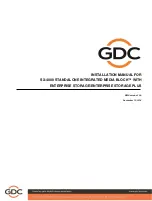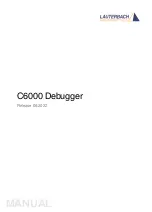
ACS550 User’s Manual
255
Maintenance
Maintenance
WARNING!
Read chapter
on page
before performing any maintenance on
the equipment. Ignoring the safety instructions can cause injury or death.
Maintenance intervals
If installed in an appropriate environment, the drive requires very little maintenance.
This table lists the routine maintenance intervals recommended by ABB.
Heatsink
The heatsink fins accumulate dust from the cooling air. Since a dusty heatsink is less
efficient at cooling the drive, overtemperature faults become more likely. In a
“normal” environment (not dusty, not clean) check the heatsink annually, in a dusty
environment check more often.
Clean the heatsink as follows (when necessary):
1. Remove power from drive.
2. Remove the cooling fan (see section
on page
3. Blow clean compressed air (not humid) from bottom to top and simultaneously use a
vacuum cleaner at the air outlet to trap the dust.
Note:
If there is a risk of the dust entering adjoining equipment, perform the cleaning
in another room.
4. Reinstall the cooling fan.
5. Restore power.
Maintenance
Interval
Instruction
Heatsink temperature check
and cleaning
Depends on the dustiness of the
environment (every 6…12
months)
See
on page
Main cooling fan replacement
Every six years
See
page
Internal enclosure cooling fan
replacement
(IP54 / UL type 12 drives)
Every three years.
See
on
.
Capacitor reforming
Every year when stored
See
on page
Capacitor replacement
(frame sizes R5 and R6)
Every nine to ten years
See
.
Replace battery in the Assistant
Control Panel
Every ten years
See
on page
Summary of Contents for ACS550 Series
Page 1: ...ACS550 User s Manual ACS550 01 Drives 0 75 132 kW ACS550 U1 Drives 1 200 hp ...
Page 4: ......
Page 10: ...10 ACS550 User s Manual Table of contents ...
Page 84: ...84 ACS550 User s Manual Application macros ...
Page 188: ...188 ACS550 User s Manual Parameters ...
Page 242: ...242 ACS550 User s Manual Fieldbus adapter ...
Page 276: ...276 ACS550 User s Manual Technical data WARNING Do not use RFI EMC filters on IT systems ...















































